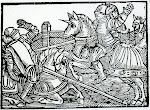
"Get me another beer, Dragon Lady...this one's empty."
Clint Eastwood is, as a recent article dubbed him, America's director.
When he goes, it will be the end of an era that is already drawing nigh with the passings earlier this year of Charleton Heston and Paul Newman. Though a handful of the films Eastwood has directed are poor products (Flags of our Fathers), his pantheon remains one of the most lauded and memorable in recent American cinematic history. On top of this achievement is the fact that, before he was a director, he was an actor of such unforgettable magnitude that the Duke was proud to call him a successor. For many years now, Eastwood has combined both his skills as an actor with his deftness behind the camera (even chipping in with scoring) to incredible, and award winning results.
Gran Torino, we are told, is the final film in which we will see Eastwood the actor, and it is an almost unbearable shame. A shame because no one will be able to replace him. A shame because if he was judged simply by his performance in Gran Torino alone, he would no doubt still be considered one of the greatest actors in history.
The film Gran Torino has a fairly simple plot, one that will be almost immediately recognizable for its genre tropes. In this way, the movie feels comfortable like a classic western, or a buddy picture. The title of course refers to Eastwood's character's treasured automobile, and the whole picture unfolds in nearly the same three locations. However, Gran Torino is far from generic and after the tropes are in place, an amazingly complex thematic mix of life/death, forgiveness, and judgement are woven together over 116 minutes through Eastwood's character and his relationships with the immigrant Ethnic Asians in his neighborhood.
 Eastwood's Walt Kowalski is an old, retired Ford plant worker who served three years in the Korean war. He is mean, cantankerous, and racist. When he is thrown into the affairs of the Asians who live next door you can already imagine that he will "learn a lesson" and "evolve." Yet, nothing so trite takes place. Instead there is a thorough development of Walt's character that is believable in every beat thanks to Eastwood's portrayal.
Eastwood's Walt Kowalski is an old, retired Ford plant worker who served three years in the Korean war. He is mean, cantankerous, and racist. When he is thrown into the affairs of the Asians who live next door you can already imagine that he will "learn a lesson" and "evolve." Yet, nothing so trite takes place. Instead there is a thorough development of Walt's character that is believable in every beat thanks to Eastwood's portrayal.To a degree, Walt does change like you'd expect from racist to accepting, from mean to kind, as he bonds with the Chinamen (actually some ethnic group called Hmong) but that change isn't what the story is about necessarily, and rather a symptom of the real growth taking place inside the character...a spiritual growth.
The story is at it's heart about how Walt comes to terms with the sins of his life and how to become at peace and understand the forgiveness of Christ (as a Catholic), and still find justice in the real world. One of the central relationships in the film is that of Walt and the 27 year-old priest from his parish, and it unfolds into one of the most realistic portrayals of the struggles of the faithful in a harsh and unforgiving world.
To me, Gran Torino was one of the most "Christian" films I have ever seen, and to elaborate too much on this claim would be to ruin some of the films more surprisingly moments. However, it is suffice to say that the true story of the film is how Walt finds salvation, in seemingly every aspect of the word. To say that Gran Torino is a "Christian" film will come as shock to any who can't get past the language (like my parents), because the other thing that can be said about the movie is it utilizes some of the most creative applications of cussing I have ever heard. Many of Walt's lines are punctuated by profanity, but to decidedly powerful effect (both in terms of intensity, and in humor.)
Beyond the story, the look and direction of the film are without question the work of a master of the craft. Without being stylishly showy, Eastwood still managed to make me mutter "wow" under my breath with his use of the camera. Gran Torino is at once classical and modern, with a steady and sure pace of editing that focuses your attention of the characters and enhances the story (as good cinematography and editing should).
See this movie, because it is entertaining and thought provoking. See this movie because it is both life-affirming and uplifting. See this movie because Clint Eastwood's Swan Song is an unforgettably ending to an even more unforgettable career. See this movie because Clint's character says, "zipperhead, slope, beaner, super spade, swamp rat, spooks," and all kinds of other hilarious politically incorrect things. See this movie because I said so.







1 comment:
Well since you put it that way, I'll find an ex-girlfriend to see it with.
Post a Comment